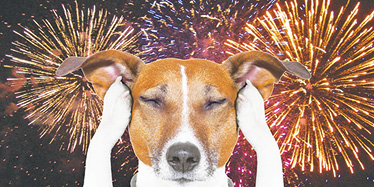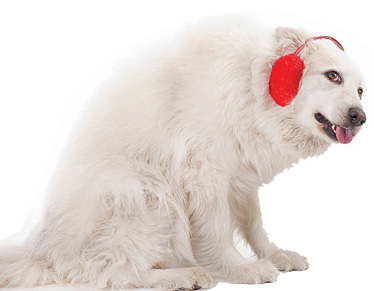Helping Your Frightened Pooch Cope With Diwali
 Don’t Jump When The Crackers Go Off:
Don’t Jump When The Crackers Go Off:
If you are scared, uneasy or nervous with the sound of firecrackers, your dog could pick up on your subtle signals. Since all dogs look to their owners for a reaction when they are apprehensive, it is important for the owner to behave in a calm manner so as not to contribute to the dog’s initial fears. Because it can take only one incident for a dog to get scared of noises, it is important that the owner associates any new noises with good things and calm attitudes.
Let Your Dog Hide:
Dogs in the wild instinctively seek out confining spaces when frightened. If your dog hides under the bed or behind a cupboard do not drag him out in an attempt to comfort him. Instead put some clothing or towels with your familiar scent next to your dog for reassurance. Make sure your dog can freely access his ‘hidey-hole’ when frightened. It would also help if you play soothing music, turn on the TV or even the fan to help drown out the noise. Then, ignore your dog. Be sure to praise him when he comes out of hiding and is more relaxed. Do not confine your dog to a particular place if he doesn’t want to be there. The ‘safe place’ approach may work with some dogs, but not all. Some dogs are motivated to move and be active when frightened and ‘hiding out’ won’t help them feel less fearful. Whatever choice your dog makes, it is up to you to help him feel safe and secure.
 Ensure Your Dog Is Safe:
Ensure Your Dog Is Safe:
In many cases dogs tend to associate the sound of firecrackers with being indoors. Such dogs will do all they can to escape out of the house. To prevent it from happening to your dog, keep him away from the front door when greeting guests to prevent him from shooting out of the house. Also make sure your dog always wears a collar with an ID tag containing your current phone number and address. If your dog gets scared and runs away, the tag will increase your chances of getting him back.
Consult Your Vet:
In severe cases of the dog being frightened, it would be advisable to seek veterinary help. Medication can help your dog feel less anxious for short time periods. Do not attempt to give your dog any over-the-counter or prescription medication without first consulting your veterinarian. Animals don’t respond to drugs the same way people do, a medication that may be safe for humans could be fatal to your dog.
Consult A Canine Behaviourist:
In a lot of cases, a dog that suffers from fear of noises can be put right with the help of a canine behaviourist. However, this takes time and patience on the part of the owner. It involves exposing the dog to the fearful noise at a very low level and slowly increasing it as the dog gets used to it. Eventually the noise is paired with pleasant events in the dog’s life. Since in most cases, it is not just the noise but also the smell and environment contributing to the fear, the programme is best carried out under the supervision of an experienced canine behaviour counsellor. Do not try to desensitise your dog at home without professional help, you could make your dog much worse or even cause a fear to become a phobia.
Punishing The Dog For Being Frightened:
Don’t try to force your dog to experience or be close to the sound that frightens him in the hope that it will cure his fears. In fact, it will worsen things. Forcing your dog to stay close to a group of children who are lighting firecrackers will make him associate the sound with the children and can cause him to get scared of children. It must be kept in mind that a dog that feels trapped can get aggressive in an attempt to escape from the situation. When frightened, a lot of dogs will urinate or chew items lying around the house in an attempt to relieve the stress brought on by the fear. Do not punish your dog for destruction or house soiling caused by anxiety or fear. It is the result of panic, not misbehaviour.
Testing The Dog:
Since it takes only one exposure to turn a fearful dog into a phobic one, the owner’s involvement is of paramount importance. In many a cases, once an owner has witnessed a fearful reaction from their dog, they will often unwittingly test their dog to see if the reaction is increasing or decreasing (“my dog is frightened of firecrackers I wonder what he will do when I fire this gun?”). Without realising, the owner could make a dog that is frightened of only firecrackers, scared of other noises too.
- Cracking The Canine Contentment Code: What Makes Dogs Happy - 10 August2024
- The Dark Side Of Pampered Pets: Is Your Kindness Harming Your Dog? - 16 March2024
- Kids And Preventing Dog Bites - 18 March2023
